China experts told Sputnik that Chairman Xi Jinping’s recent visit to Europe won’t bring immediate changes but is part of Beijing’s broader and long-term geopolitical strategy.
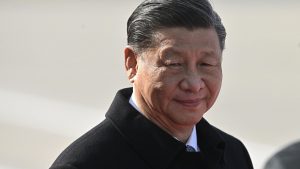
Xi Jinping’s recent European tour was largely perceived as a PR success by China, highlighting the EU’s interest in Chinese investments and market access despite its tough rhetoric, according to Jeff J. Brown.
Brown is the author of The China Trilogy, presents blogs and podcasts at China Rising Radio Sinoland, is the producer of China Tech News Flash!, is co-founder and curator of the Bioweapon Truth Commission Global Online Library, and is the founder of Seek Truth From Facts Foundation.
“[French President Emmanuel] Macron and Xi signed 18 agreements on technology, agriculture, aviation, green development, SME [small and medium enterprise] cooperation, and people-to-people exchanges, which is good PR for both countries,” Brown told Sputnik, commenting on the first leg of Xi’s trip.
“Xi and Macron will play to their citizens’ hope for deeper Sino-European cooperation and the Old Continent’s industrial sector will continue to quietly invest billions in China, behind the back of Uncle Sam.”
France has a much better reputation among the Chinese than the Five Eyes, continued Brown, referring to the Anglophone intelligence alliance encompassing the US, UK, Canada, Australia and New Zealand.
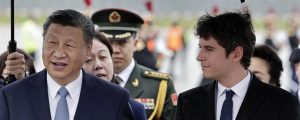 France’s Prime Minister Gabriel Attal (R) greets China’s President Xi Jinping upon his arrival for an official two-day state visit, at Orly airport, south of Paris on May 5, 2024 – Sputnik International, 1920, 10.05.2024
France’s Prime Minister Gabriel Attal (R) greets China’s President Xi Jinping upon his arrival for an official two-day state visit, at Orly airport, south of Paris on May 5, 2024 – Sputnik International, 1920, 10.05.2024
Xi’s European Tour: China Offers EU Way Out of Economic Decline
However, EU Commission President Ursula von der Leyen was also present at the meeting “to wag her finger in Xi’s face to remind him of how awful China is towards Europe and if it wasn’t for Beijing’s endless support for Russia, NATO would not be losing the war in Ukraine,” remarked the expert.
The EU’s relationship with China is going downhill, mostly due to US pressure, even though the trend contradicts the bloc’s economic interests, according to Brown.
His views were shared by veteran Asia-Pacific affairs expert Thomas Pauken II.
“We’re going to see probably improved relations between China and France,” Pauken told Sputnik, explaining that the talks likely included some “key factors in how France and China, their trade and investment ties, [evolve]. But, this will not lead to an improvement between China and the EU Commission.”
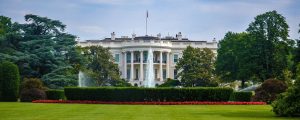 White house – Sputnik International, 1920, 10.05.2024
White house – Sputnik International, 1920, 10.05.2024
US Poised to Levy New Tariffs on China’s ‘Green Tech’
The EU is confronted with difficult decisions, with the US mulling sanctions on those Chinese banks that finance alleged dual-use technology exports to Russia and potentially pressuring the European bloc to take similar action, European think tank Bruegel – which is led by a former IMF official – has suggested.
In April, US Secretary of State Antony Blinken warned Beijing over supposed dual-use sales to Russia. Earlier this month, Washington imposed restrictions on 31 Chinese companies allegedly “providing critical technologies” to Russia. In contrast, the EU has banned just a few Chinese firms so far, according to the think tank.
In addition, the European Commission is continuing to investigate Chinese-made electric vehicles (EVs) and wind turbines as part of its efforts to slap additional tariffs on the People’s Republic’s exports to Europe.
“The moment of truth will come when the EU needs to take real action on either of these two fronts and the differences between EU members become unavoidable,” the think tank wrote.
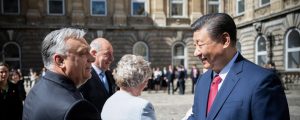 Chinese President Xi Jinping (R) shakes hands with Hungarian Prime Minister Viktor Orban (L) prior to a welcoming ceremony in Buda Castle of Budapest, Hungary on May 9, 2024. – Sputnik International, 1920, 10.05.2024
Chinese President Xi Jinping (R) shakes hands with Hungarian Prime Minister Viktor Orban (L) prior to a welcoming ceremony in Buda Castle of Budapest, Hungary on May 9, 2024. – Sputnik International, 1920, 10.05.2024
Xi-Orban Talks: What Did China and Hungary’s Leaders Agree On?
China doesn’t seem intimidated by any of those prospects: Xi denied von der Leyen’s accusations with regard to Beijing’s apparent “unfair” trade practices and made it clear that the People’s Republic won’t allow the West to meddle in its business relations with Russia.
Having firmly demonstrated that China won’t change its economic, political and foreign policy, Xi paid visits to Serbia and Hungary where he signed a series of infrastructural and investment deals and agreed long-term strategic cooperation with the two countries, one of which is an incumbent EU member.
“The real winners of Xi’s visit are the peoples of Serbia and Hungary, as their respective leaders, Aleksandar Vucic and Viktor Orban, are the only two Western leaders who work hard to represent the interests of their peoples,” Brown said.
“Hungary already has a Chinese-built electric manufacturing plant coming online, a Fudan (Shanghai) University campus, bilateral trade is surging and Chinese companies like the Bank of China, Huawei, Wanhua, CATL, EVE Energy, Sunwoda and BYD are investing billions, while the rest of Europe looks on with envy. The same goes for Serbia, with China investing billions of euros in green energy and infrastructure,” he continued.
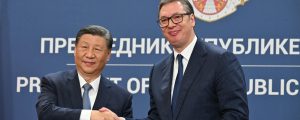 Chinese President Xi Jinping (L) and Serbian President Aleksandar Vucic (R) shake hands after signing bilateral documents during a meeting in Belgrade, on May 8, 2024 – Sputnik International, 1920, 08.05.2024
Chinese President Xi Jinping (L) and Serbian President Aleksandar Vucic (R) shake hands after signing bilateral documents during a meeting in Belgrade, on May 8, 2024 – Sputnik International, 1920, 08.05.2024
Serbia, China to Develop Belt and Road Initiative – Joint Statement
8 May, 22:09 GMT
China’s growing cooperation with Serbia is also a friendly signal to Moscow, according to Pauken.
“Serbia is a strong ally of Russia,” Pauken said. China’s support to Serbia to some extent helps the Balkan state maintain economic and political sovereignty amid growing pressure from the European bloc over Belgrade’s refusal to impose sanctions on Russia.
By enhancing cooperation with Hungary and Serbia, China could demonstrate to EU member states that Chinese-European cooperation could be really lucrative and mutually beneficial, according to Sputnik’s interlocutors.
By building new EV and battery plants in Hungary China could obtain deeper access to the EU market and may avoid additional duties on imported Chinese EVs if the EC’s ongoing investigation warrants it, according to Bruegel.
Still, Politico admitted that even a 30 percent tariff cannot render Chinese manufacturers uncompetitive vis-à-vis their European peers due to the Asian industrial giant’s cost-effective production and robust supply chains.
In addition, by maintaining mutually beneficial cooperation with Hungary, an EU member state, China may potentially evade Brussels’ sanctions attack, since Budapest could veto such a policy that requires a unanimous vote of all EU member states, as per the European think tank.
Basically, all the objectives set out by the Chinese leadership ahead of the European tour were achieved, according to Pauken.
“I think this is going to create a major shift at least for France, Hungary and Serbia to draw closer to China,” the Asia-Pacific consultant concluded.
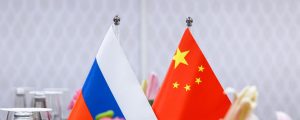 Russian and Chinese flags. File photo – Sputnik International, 1920, 09.05.2024
Russian and Chinese flags. File photo – Sputnik International, 1920, 09.05.2024
Russia-China 2024 Trade Growth Overshadows Relevant China-US Figures
9 May, 06:32 GMT
By Ekaterina Blinova
Published by Sputnik Globe
Republished by The 21st Century
The views expressed in this article are solely those of the author and do not necessarily reflect the opinions of 21cir.com
